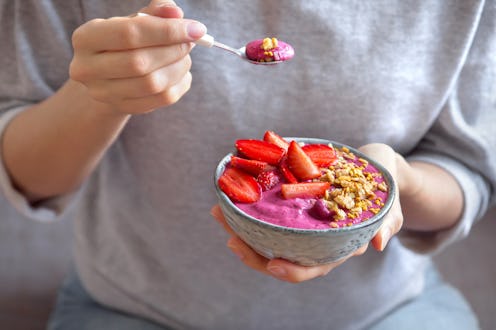Life
This Is The Super Easy Way To Make Sure Your Probiotics Are Actually Working

At practically any grocery store nowadays, you can find probiotic supplements and drinks in their own refrigerated section. Probiotics, which are live microorganisms, can have a majorly positive impact on your health — especially on your digestive health, mental health, your immune system, and your heart. You've probably heard all about probiotics and their benefits before, but have you heard of their closely-related counterpart, prebiotics? The term can be confusing, but it's actually just a fancy word for carbs and fiber that we can't digest, but that feed probiotics to help them do their jobs.
"Prebiotics are what the gut bacteria feeds on to function better," Frida Harju-Westman, the in-house nutritionist at health app Lifesum, tells Bustle. "Prebiotics are typically non-digestible fiber that passes through the system and stimulates the ‘good’ bacteria in the gut, effectively feeding them on the elements that haven’t been digested by the system earlier." Basically, as gross as it sounds, you're providing the microorganisms that live in your stomach with a healthy (and necessary) meal by consuming prebiotics.
It may come as a surprise, but many foods you probably already have in your kitchen contain prebiotics. In fact, Harju-Westman says that "you are likely already consuming prebiotics as part of your day to day diet, without realizing it." Garlic, onion, fruits, Jerusalem artichoke, leeks, whole grains, and raw chicory root all contain these indigestible fibers that your gut bacteria likes to snack on.
Though prebiotics cannot be digested, they still have several important functions for your health and wellness. Harju-Westman explains, "Prebiotics tend to work together with probiotics to improve the overall health of the gut." She says that "While more research into how they affect gut health needs to be done, prebiotics are thought to improve cholesterol levels, boost the immune system, and even reduce the risk of developing cardiovascular disease."
However, eating too many foods with prebiotics, or taking too much of a prebiotic supplement can also cause mildly adverse side effects. Dr. M. Andrea Azcarate-Peril, an Associate Professor of Medicine in the School of Medicine at UNC Chapel Hill and Director of UNC's Microbiome Core, says that if you take or consume too many prebiotics, "it can give you a stomach ache. You'll have gas, you'll feel bloated, and it can give you diarrhea." She explains that certain prebiotic supplements are primarily given to patients with constipation. "It's a fiber, so it will gather a lot of water in your gut, and then push everything out."
So, is it worth forking out cash to buy prebiotic supplements? In short, experts say the answer depends on you and your personal nutrition needs. "Americans typically take in only half the recommended amounts of fiber each day," Amy Udani, regulatory pharmacist and founder of theEluminati Magazine, tells Bustle. "A prebiotic supplement may be necessary to fulfill basic nutritional needs where healthy diet choices and nutrient dense foods are lacking." Additionally, Dr. Azcarate-Peril says taking probiotic supplements with added prebiotics is always a good idea when you're recovering from being sick. "If you have recently had a cold, or if you went through a round of antibiotics, you may want to take these supplements to replenish your gut microbiota," she says.
Both Dr. Azcarate-Peril and Harju-Westman agree that, overall, the best way to ensure you receive the full health benefits of prebiotics is to ingest them through your diet when possible. "It is always better to get your nutrients naturally, through food, as opposed to by taking supplements — which won’t be the pure nutrient," says Harju-Westman. But, if you do opt to buy prebiotic supplements, they can be found online, at pharmacies, or at grocery stores like most other supplements and vitamins.
Prebiotics may not have all the hype that probiotics do, but they play a crucial role in keeping your gut bacteria happy and well fed, and they keep you healthy. So whether you're eat these indigestible fibers, or consume them via supplements, make sure you get enough prebiotics.